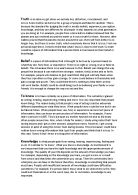The relationship between belief and knowledge is that a belief is knowledge if the belief is true, and if the believer has some sort of justification. According to the theory that knowledge is justified true belief, in order to know that a given proposition is true, one must not only believe the relevant true proposition, but one must also have a good reason for doing so.1 From the quote, we have to justify for why and what we believe. The difference between knowledge and belief is that knowledge requires proof, but it is not fully clear how much evidence is necessary. Evidence is what people ask for when they want to verify something to be true. Features of belief, which include the ideas of justification, warrant, , and . Of these four terms, the term that has been most widely used and discussed in the past twenty years is "justification". Loosely speaking, justification is the reason why someone (properly) holds the belief, the explanation as to why the belief is a true one, or an account of how one knows what one knows.2 each one of us is responsible to what we believe. As beliefs are developed totally randomly we must ensure that whatever we believe corresponds to the actual word. Let’s look at an example, a racist juror who decides before the case that the man must be guilty because he is black. Now, it happens to be the case that this man is in fact guilty, so this is in fact a true belief. However, we would hesitate to call this knowledge due to the fact it is based on an irrational justification (racism) therefore we would not say the juror knew the man was guilty because he lacked justification on good and relevant grounds. Thus for a belief to be justified, there must be some reason to think that it is true; this is what justification is all about.
Faith is another area of knowledge where we believe different aspects without actual physical evidence. Faith is belief in the absence of or in opposition to evidence. When we say that a person has faith, we often do so specifically to suggest that they lack evidence for their belief3. All or most people belive in the existence of God and other supernatural activities but there is no supporting evidence for this existence. Faith is a special kind of belief which is more about what is believed, rather than about how it is believed. It is a combination of belief, without proof and with hope. It is quite possible to believe in something while lacking faith in that belief. Faith is belief without evidence. Taking something on faith means believing it without firm proof of your own senses.
From common knowledge we believe a lot of stuff just because the founders haven’t proven it wrong. For example the discovery of gravity by Isaac Newton. Isaac Newton thought about gravity and the apple. He thought that maybe gravity was not just limited to the earth and the objects on it. What if gravity extended to the moon and beyond? 4 Just because we believe that all through-out space there is gravity we are not a hundred percent certain about it because nobody has gone light years beyond Earth to prove it true.
All in all







